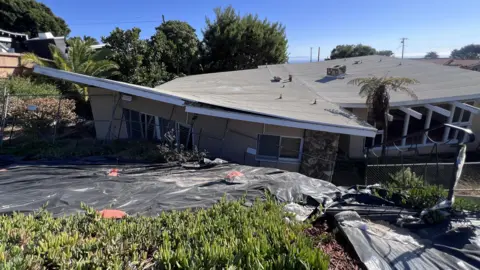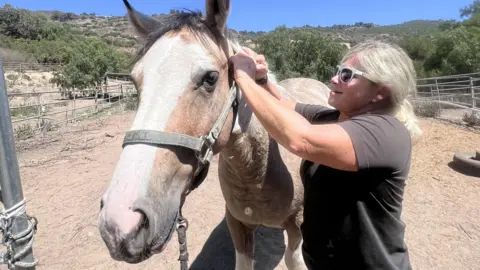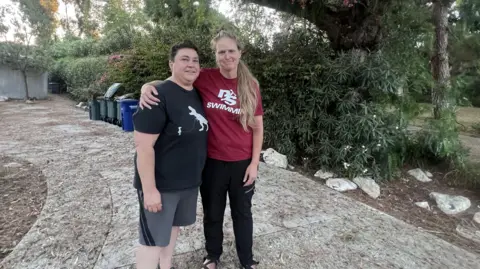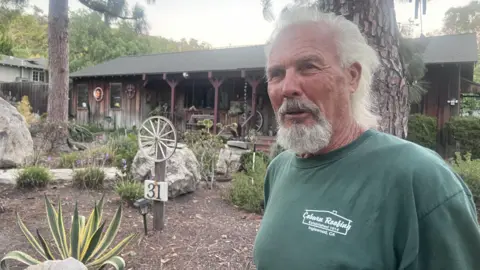ARTICLE AD BOX

 BBC
BBC
The land is moving and sinking so fast in parts of the California community of Rancho Palos Verdes that authorities have switched off gas and electricity “indefinitely” to hundreds of homes.
The area has long grappled with unstable land but now the landslides causing the problem have accelerated. Some buildings could be swallowed completely.
Power company Southern California Edison had to cut power last week “to avoid the risk of utility equipment igniting a wildfire” in the rugged areas where the land is shifting.
SoCalGas began to shut off natural gas services to the area in May, and on Friday expanded the outage to 54 more homes after a gas line break last week.
The neighborhood of Portuguese Bend is the worst hit by the problem.
City officials issued an evacuation warning there a week ago.
Some residents left, but others are determined to stay.
They're banding together, installing generators as well as the sewer system and pumps needed to expel the groundwater causing the landslides.


Jackie Golison with one of her three horses
One man's house “split in half”, Jackie Golison told the BBC on a recent tour of her neighborhood.
Driving on buckled roads, Ms Golison said a few months ago streets were smooth. Now they’re like the Disney attraction “Mr Toad’s Wild Ride”.
She points to a home ripped off its foundations with the front door elevated about 8ft from the ground. The scene looks like the aftermath of an earthquake.
“It’s worse than an earthquake,” she said. “It’s heaven in here though. Pure bliss when it's not moving.”
Portuguese Bend has ocean views and sea breezes. Horses and peacocks roam the pepper tree-lined streets.
The ground in the affluent neighbourhood has been shifting for decades, usually about a manageable foot a year. Now it’s moving that amount a week, as two years of heavy rains accelerated the shift, causing irreparable damage to some homes and prompting California to declare a state of emergency.
'Forces of nature more than we can control'
Not everyone can afford to invest in moving off-grid - the sewer system is now being run by generators paid for by locals - or they worry that the city will shut the roads and they will be forced to leave anyway.
Mayor John Cruikshank, a civil engineer, said he thinks neighborhoods like Portuguese Bend will need to stay off-grid to survive. He’s speaking to private companies about possibly installing power walls, which store energy for later use.
He’s also trying to convince the state to extend the emergency declaration to get funding to help individual homeowners.
“The forces of nature sometimes are much more than we know how to control or have the ability to control,” he said. “We’re still searching for engineering solutions.”
While the land has always been shifting under their feet, residents of Rancho Palos Verdes understand that climate change is exacerbating their problems.
“The two years of rain didn't help,” said Jay Golison, Jackie’s husband.
“A drought, as bad as it sounds, sounds pretty good to us right now.”
Outdoor trails, which used to be popular with locals and visitors alike, are now closed because of fissures and air pockets that trip up horses, hikers and mountain bikers.
“I couldn’t see the bottom in one of them,” Ms Golison said of fissures that caused her to fall off her bike.
She often goes to bed at night crying, worried what they will do if they have to leave and where they can afford to go with three horses, three dogs and all their investments in a potentially sinking home.
The home the couple have lived in for just two years has only a few minor cracks.
“We are still living in it. We just built it and put every dime we have into it,” she said.
Not everyone is sympathetic to the plight of homeowners in the wealthy neighbourhood. Social media is filled with comments about how residents should have known there was an issue, given a landslide first destroyed homes there in the 1950s.
But locals adapted. They raised homes off foundations onto adjustable beams so the buildings would move with the land - a solution that worked for decades. Houses there were also cheaper than most coastal property in California, so for many it was worth the risk for a slice of paradise.
The Trump National Golf Club is a mile away from Portuguese Bend. The former president bought it in 2002 after it went bankrupt because the 18th hole fell into the ocean in a landslide. It’s still open for business.
Those who are struggling to afford the necessary renovations and costs to stay, including elderly residents on fixed incomes, feel they've been failed.


KC King and Shari Twidwell in Portuguese Bend
Shari Twidwell was raised in Portuguese Bend and now lives in Wyoming, but is in town to help her elderly parents.
They have lived here for 54 years but are at a hotel because they can't stay in their home, which is without power even the region bakes in a heatwave.
“All of these people are breaking. And their houses are breaking,” said Ms Twidwell, whose father, 88, is blind and has advanced Parkinson’s disease.
Kendall and KC King, siblings who live next door, comfort her.
The Kings helped evacuate their elderly mother from their home that day and understand why she's upset. They all worry about being able to afford a conversion to living off-grid.
“Did you install the propane?” neighbour Patrick Burt shouted from across the street.
“I was too worried about a fire or explosion,” Ms Twidwell responded. Mr Burt, 74, offers to do it for her.
“This place is like a bomb with all this propane,” he said.
Mr Burt got a quote that day for a $40,000 (£30,640) solar panel system. Neighbors discussed sharing the cost.


Patrick Burt wants to stay in his neighbourhood
They agree that Portuguese Bend is worth trying to fix.
“They can’t make you leave. And I will not leave,” said Mr Burt. “You can’t buy ambiance. You can't buy this somewhere else.”
Ms Twidwell said she understands climate change is partly to blame, but is furious at what she says are failures that made the situation worse.
“They were supposed to line the canyon” to shift water to the ocean so it doesn’t settle under their feet, she said.
“Instead they spent all the money on a sewer system, which is now failing.”
Residents like her parents are now scattered in hotels or staying with friends.
“They are on their own. And that is terrifying for these people who have been here for more than half of their lives," she said.
"They worked so hard to build this - it's not just a house. It's an extended family. They are being completely destroyed in the sunset of their lives.”

 4 months ago
20
4 months ago
20








 English (US) ·
English (US) ·